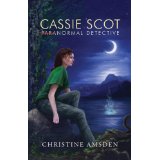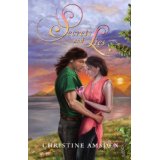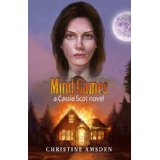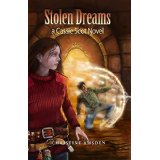When I first noticed Christine Amsden’s book on Aileen Aroma’s book page I felt only mild interest. The cover seemed to align with middle grade fiction and, though I like YA books, I tend to steer clear of anything aimed younger than that. Then I read the blurb and thought, “hmmm, that doesn’t sound middle grade.” Then I noticed it was the fourth in a series. Another, “Hmmm.”
Long story short, I like to start at the beginning and, since the price of the first book was set at an easily accessible $2.99, I figured I’d try it. And then I became addicted.
One week and four books later I was left gasping, sitting on my couch wishing there were more books in the series. I cannot express to you how sad I am that I’ve turned the last page in the last book. I’m happy with the way it ended, but its like eating Hershey Kisses; you never want to see the bottom of the bag.
Cassie Scot is one of the most fully realized, complex yet eminently likeable heroines I have ever encountered. Her spirit, determination and sheer grit are amazing. Like a Ming vase I once saw in a museum, she is inherently flawed, but all the more beautiful for the cracks in her surface. At bottom, Cassie carries her honor as an essential element of her soul.
My favorite plot element in this series is the treatment of “talent” vs. “gift.” By proposing the idea that all of us possess “gifts,” tied to our souls and therefore inseparable from who we are, Amsden opens up a connection to her characters that often evades authors of paranormal and fantasy novels. By reminding us that, in their own way, eidetic memory, empathy and physical strength each have a touch of magic, she makes magic personally accessible to her readers.
Talent, (the amount of magical fire-power a person commands) on the other hand, flows in the blood and is hereditary in its various strengths and permutations. Looked at this way, we see magic as something morally neutral. The big bonus for the author is that she can then use talent as a metaphor for power in its most basic form. Power/magic is neither good nor bad. It’s all in how you use it.
These two premises (premi?) open up an entire world of plot possibilities, which Amsden explores in unexpected and satisfying ways. Amsden uses the paranormal to explore deeper issues of honor and moral judgement in ways I have seldom seen in this genre. In four books, I did not find a single false note or disappointment in the writing.
One warning: you might as well buy all four books at once. Though far healthier, they are like potato chips; you can’t read just one.




